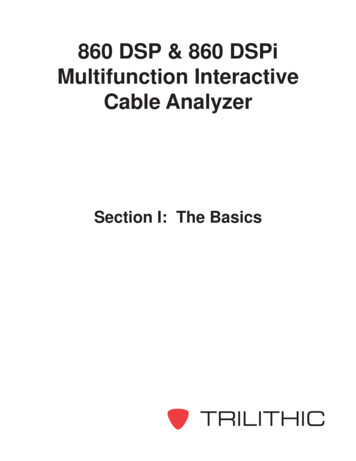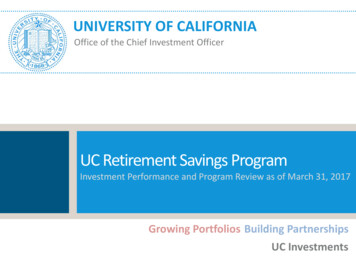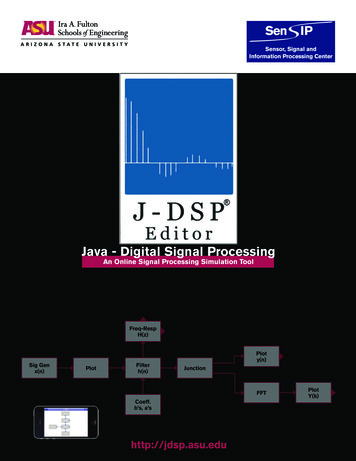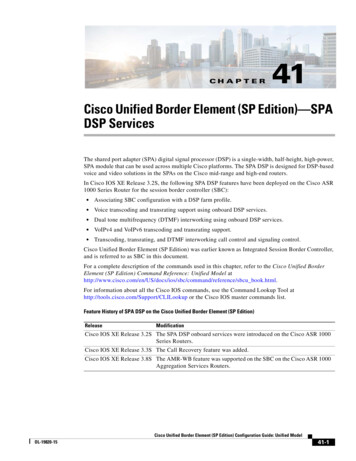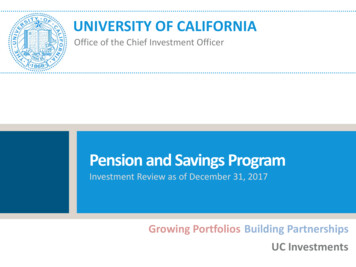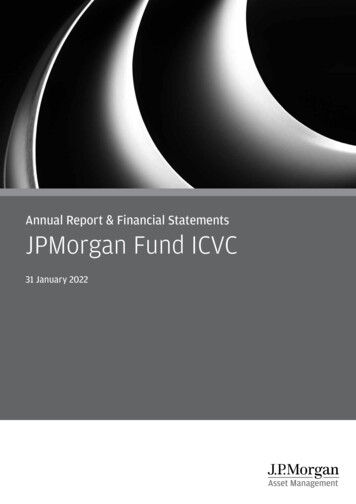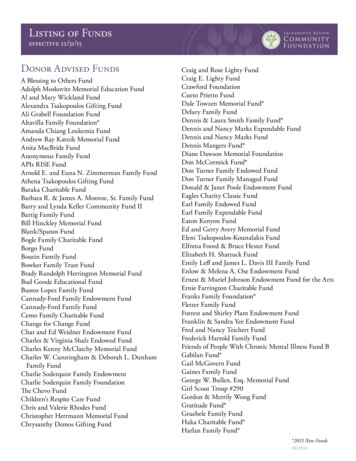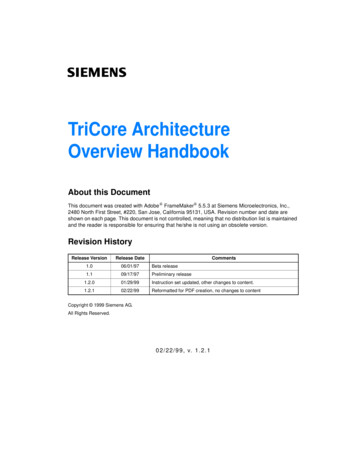
Transcription
DSP CORE FUND2020-21
DSP CoRe FundDSP CoRe Fund (“the Scheme”)The Scheme is a close ended Scheme of DSP Alternative Investment Fund - Category III (“Fund”), a SEBI-registered Category IIIAlternative Investment Fund set-up under the SEBI (Alternative Investment Funds) Regulations, 2012. The Scheme was launched bythe Fund in September 2016.The audited financial statements of the Scheme for the period ended March 31, 2021 are enclosed herewith for reference andinformation of the unitholders of the Scheme.A commentary on equity market performance and performance of the Scheme is given herewith.I. Equity Marketsa. Financial Year 2020 - 21What a year this has been. A benign start, punctured by a contagious pandemic, cushioned by easy liquidity and then catapulted bythe advent of a vaccine. Markets have been on a wild ride, with so much optimism now that even bear-case scenarios have turnedbullish. A point-to-point observer could be forgiven to think that 2020 was uneventful.Indeed, the markets have doubled over the past year. This of course masks a precipitous drop of 35% at the end of the last fiscal,given Covid’s first wave fears. From thinking Covid would not hit India, to going through a lockdown, to many offices still in workfrom home mode a year later, much has transpired.In June 2020, the Government announced a much awaited fiscal stimulus. At US 270bn, or 10% of GDP, it was a big one,although the real fiscal impact was lower at 1%, highlighting stretched fiscal finances. The package’s focus was on medium-termsupply-side measures. Funding would largely come via Government borrowings and future public sector liabilities. It was not ademand stimulus i.e. no tax cuts, large infra spend or direct transfers of cash. However, the package covered many sectors andfocus was more on ‘survival’ than ‘growth’. For the near term, schemes such as increase in daily-wage work, free food grains forthe needy and a US 40bn credit guarantee scheme to incentivize banks to lend to small businesses (whom they had shied awayfrom lending to in recent years) were good. Longer term reforms like in agriculture, a commercial mining policy (more privateinvestments) and privatization of public sector companies were also good.By July 2020, the shock 35% market crash in March 2020 was followed by a shock 35% market rally. With life not yet back tonormal, little wonder that most market participants were left scratching their heads – awaiting the correction round-the-corner.India’s lockdown at the time was opening up before the virus curve peaked. India had gone from 200,000 total Covid cases to 600,000, and ranking 4th in total cases, behind USA, Brazil and Russia. Financials had rallied 35-75% in the time, although wewere cautious on financials (ex. insurance) since April 2020 driven by the pandemic induced growth shock, change in borrowerbehavior (30-40% of loans under repayment moratorium) and some normalization of valuations after a sharp fall in March 2021.Stocks rallying on expectations of a V-shaped recovery as the economy unlocks was understandable; however, our learnings fromother economies indicated two risks (a) pent-up demand (unsustainable?) and (b) further lockdowns.Quarterly results by August 2020 told us that Indian companies across sectors demonstrated superior cost rationalization – witha combination of cuts across overheads, travel spends, discretionary spends on advertising and promotion etc. Margins hencesurprised positively. In general, a lot of the larger well established companies gained market share from smaller informal ones, asthe latter found it harder to operate efficiently amid all the lockdowns and frequently changing restrictions. During earnings callsover the last quarter of CY20, the catchphrase of from our analyst team was “these margins are the highest ever reported” – acrossa variety of sectors and companies. Margin expansions of 400-500 bps were not uncommon, driven by better cost control (loweremployee, travel and promotional spends). To be sure, some of this would reverse and normalize over time.During the year, the Indian Government announced a Production Linked Incentive (PLI) scheme for boosting manufacturing across13 sectors with US 30bn in fiscal incentives to be given over the next few years. The sectors include autos, batteries, pharma,telecom equipment, textiles, food products, specialty steel, white goods, electronics and solar panels. Companies that set-up shopin India would be eligible for certain incentives. For example, a 4-6% fillip a year for mobile phone manufacturers, assuming predefined levels of expansion and exports over a few years. Such a scheme could eventually help shift global supply chains to Indiaand in the process create jobs and increase the share of manufacturing in GDP (stuck at 18%). No doubt a very good beginningbut execution will be key. Given that key ingredients such as labor & tax reforms are being effected, along with realignment ofglobal supply chains, we are excited by this initiative’s medium term prospects. The PLI scheme is expected to add 1.7%-2% to2027 GDP.In Feb 2021, the Union Budget was announced for fiscal year 2022 (ending 31-Mar ’22). After a tumultuous pandemic year, theneed of the hour was to revive growth. The Government acknowledged this by delivering a Budget that kept growth front andcenter, while relegating fiscal deficit to the backseat, for now. The growth focus came from:a) a robust capex push i.e. productive infra spends totaling US 125bn (18.3% YoY) led by railways, water, renewable energy,roads;b) allocation towards public healthcare (to support the vaccination program);2
DSP CoRe Fundc) focus on divestment as well as monetization of assets;d) increased allocation towards PSU bank recapitalization ( USD 2.7bn), a proposal to privatize two PSBs, set-up an ARC (badbank) and a Development Finance Institution (lending portfolio of USD 70bn over 3 years);e) a continued Make in India push, which augurs well for infra, with plans to set-up mega textile parks, SPV to monetize surplusgovernment / PSU land parcels, hike import duties to incentive localization etc.On the fiscal side, the Government had previously targeted a 3.5% (of GDP) deficit for FY21, but Covid jeopardized that. TheFY21e deficit was revised higher to 9.5% of GDP (consensus: 7.5%), with FY22e pegged at 6.8% (cons: 5.5%). Our takeawayswere that not only is the expansionary fiscal policy welcome at a time like this, but so too is the improved transparency as theGovernment has bought several previously off-balance sheet items into the budget. This was also not a ‘stimulus’ or ‘dole out’budget. The emphasis was on creating productive assets – roads, railways, water grids, urban transport etc. instead of just dolingout subsidies. Execution is key as always, especially in the case of strategic divestments, power sector reforms, setting up a ‘badbank’, development finance institution etc.As of 31st March 2021, the Nifty 50 Index is down just 5% off all-time highs, and trades at 28.7xFY21e, 20.5xFY22e and 17.8xFY23e PE multiple. These valuations are well above long term averages, and imply an FY22 EPS growth of 40% over FY21,and an FY23 EPS growth of 17% over FY22 on our estimates. India has received a disproportionate share ( US 30bn) of FPIinflows to EMs since Jan’ 20, versus outflows from Korea (-US 30bn), Taiwan (-US 29bn) and Thailand (-US 9bn). On a rolling12-month basis FPIs net bought 37bn in Indian equities – the highest ever. Given domestic mutual funds have been seeingredemptions (same money probably being deployed back into the market directly by retail), if FPIs sell, we wonder if retail wouldhave the temperament to stabilize and take the other side of the trade.Earnings are arguably one of the most important requirements to keep markets afloat from a fundamental standpoint, but in thisliquidity driven environment, markets can stray well ahead of fundamentals. While the markets will take their own course, wepray and hope that the Covid menace is quickly resolved and that vaccinations are administered to everyone, and that normalcyis restored.b. Future Outlook (as on 31st March 2021)Global growth continues to improve sequentially and uniformly across the globe. We had multiple Covid infection waves emergeacross regions, though with hospitalization and mortality under control and vaccine roll-outs broadly on-track, the sequentialgrowth improvement should not be derailed. Globally fiscal and monetary conditions remain accommodative – with stimulus atunprecedented levels, breakeven inflation levels are moving up as investors hedge against a tail risk in inflation. Equity valuationsare rich across the globe in absolute levels, but in terms of equity risk premium they look attractive – hence all the attention is onbond yields if they upset this equilibrium.Signposts we are monitoring:1. Monetary Actions - unprecedented easy monetary conditions remain;2. Fiscal Action - high levels of stimulus globally especially by DM Governments;3. Covid vaccine roll-out broadly on track and4. Sequential macro improvement strong - though India seeing a sequential drop due to lockdowns.Overall macro data points continue to indicate improvement on a sequential basis globally. However, a second wave in India islikely to lead to a mild temporary pause in overall economic activity. As markets have rallied, equity assets have priced in a lot ofthe improvement in the last 6 months. Thus, we have reduced our overall exposure as stocks have come closer to our price targetsand have a largely defensive tilt in the portfolio.II. Scheme PerformanceAbsolute Return (FY 2020-21)Absolute Return since inception*Annualised Return since inception*89.04%72.30%12.93%*Date of Inception: October 10, 2016All data as of / till March 31, 2021; FY 2020-21 01st April, 2020 to 31st March, 2021Note: Performance is computed based on Class A1 NAV, which is gross of all expenses and taxes (booked on a monthly basis) and priorto any performance fee.The latest CRISIL AIF Benchmark details are available as on September 30, 2020. For details on CRISIL AIF Industry benchmarkperformance v/s Scheme performance, click here3
DSP CoRe FundIII. Summary of the changes done in the valuation policy during the FY: 2020-2021Please find below the summary of additions/changes in valuation policy during the FY 2020-2021. The details regarding valuation ofsecurities available in the PPM of the st Rate FuturesThe exchange traded Interest Rate Futures would be valued based on theDaily Settlement Price or any other derived price provided by the exchange.Interest Rate Swaps andValuation would be done at average of Price provided by valuation agencies.other Debt OTC DerivativesIn absence of Price from valuation agencies, valuation shall be arrived atbasis guidance from Investment Committee.Market Linked DebenturesValuation would be done at average of Price provided by valuation agencies.In absence of Price from valuation agencies, valuation shall be arrived atbasis guidance from Investment Committee.ParticularsIV. Reporting on discharge of Stewardship responsibilitySEBI vide its circular CIR/CFD/CMD1/168/2019, dated December 24, 2019, requires reporting of the status of compliance with thestewardship principle as part of its annual intimation to clients / beneficiaries. The stewardship code was applicable with effect fromJuly 1, 2020.The subsequent paragraphs detail the manner in which the elements of the stewardship code have been discharged by DSP InvestmentManagers Private Limited (DSPIM).The Board of the Company and DSP Trustee Private Limited (Trustee Company) at its meeting held on February 11, 2020 and February24, 2020, respectively had approved the policy on discharge of stewardship responsibilities. The policy on discharge of stewardshipresponsibilities (‘Policy”) sets out the framework and guidelines on discharge of the stewardship responsibilities of the Company.The responsibility for the overall implementation and execution of policy rests with the Stewardship Committee of the Company.Accordingly, the Stewardship Committee of the Company, with an endeavour to safeguard the interests by enhancing monitoring andengagement with investee companies, has laid down certain principles. During the year, 4 stewardship meeting(s) were conducted.The Status of Compliance with the Stewardship Code is stated Principle 1Institutionalinvestorsshould Compliedformulate a comprehensive policy onthe discharge of their stewardshipresponsibilities, publicly disclose it,review and update it periodically.The Policy on discharge of stewardship responsibilities(Policy) had been approved by the Board of the Companyand Trustee Company at its meeting held on February 11,2020 and February 24, 2020, respectively. Further, thestewardship activities for Financial Year 2020-21 werenoted by the Board of the Company and Trustee Companyat its meeting held on April 22, 2021 and April 23, 2021.The Policy is disclosed on the website of the Companyunder mandatory disclosure licy.pdfPrinciple 2Institutional investors should have Complieda clear policy on how they manageconflicts of interest in fulfilling theirstewardshipresponsibilitiesandpublicly disclose it.The conflict of interest policy disclosed on the websiteunder mandatory disclosure section specifies various controlmeasures and prescribes procedures to be followed by theCompany for identifying and managing conflicts. Therewas no significant instance of conflict of interest noted bythe stewardship committee at its meeting held during theperiod.Principle 3Institutional investors should monitor Compliedtheir investee companies.The Investment Team of the Company engages with theinvestee companies as part of the research process thatleads to an investment in an investee company, whichinclude meeting with the management. The StewardshipCommittee at its periodic meetings has reviewed monitoringand engagement activities carried out by the investmentteam for the said period.
DSP CoRe nciple 4Institutional investors should have a Compliedclear policy on intervention in theirinvestee companies. Institutionalinvestors should also have a clearpolicy for collaboration with otherinstitutional investors where required,to preserve the interests of theultimate investors, which should bedisclosed.The Policy covers when and how to intervene, if anyintervention is required in the investee companies. TheStewardship Committee reviews the intervention in theinvestee companies. Intervention during the period wereplaced before the Stewardship Committee at their periodicmeetings. Further, there were no instances of collaborationwith other institutional investors during the period.Principle 5Institutional Investors should have a Compliedclear policy on voting and disclosureof voting activity.DSP Alternative Investment Fund has comprehensive votingpolicy which includes details of mechanisms of voting,circumstances in which voting should be for/against/abstain, disclosure of voting, etc. The voting policy, votingdecisions (including rationale for decision), use of proxyvoting/voting advisory services, etc.The details of votes cast during the quarters of the FinancialYear 2020-21 are disclosed on the website of the Companyunder mandatory disclosure s/proxyvotingPrinciple 6Institutional investors should report Compliedperiodically on their stewardshipactivities.The Company in addition to the disclosure on its website asspecified above shall also circulate to unitholders a statusreport for every financial year, as part of annual intimationto the investors. The report envisaged here inter-alia includedetails indicating the compliance/any variances with theprinciples laid down to the stewardship policy.V. Enquiries & Legal Action, Liabilities, Conflict of Interest and other disclosuresa. The details of pending/closed litigations, pending disputed tax liabilities and past administrative warnings/deficiencies letters hasbeen updated in the latest Private Placement Memorandum (“PPM”) of the Scheme sent to the investors.b. There are no liabilities against the Fund.c. The Scheme has made temporary investments in DSP Mutual Fund scheme and fixed deposits, pending deployment of funds as perthe investment objective of the Scheme.d. DSP Investment Managers Private Limited (DSPIM) acts as the Investment Manager of the Scheme, serves as the Asset ManagementCompany (AMC) to DSP Mutual Fund (DSPMF) and also provides investment management and trade execution related services tooffshore sovereign funds. DSP ADIKO Holdings Private Limited holds 54% and DSP HMK Holdings Private Limited holds 34% ofthe shareholding of the AMC and the balance 12% is held by Ms. Aditi Kothari Desai and Ms. Shuchi Kothari in equal proportion.DSPIM also provides Investment Management Services to DSP India Fund and DSP India Investment Fund (both based out inMauritius). The AMC also provides a non-binding advisory services to the offshore funds/offshore investment manager, who ismanaging an offshore fund which will invest through FPI route. The AMC provides investment management advice and executionservices to DSP ICAV, an umbrella type Irish Collective Asset-management Vehicle. The AMC is the holding company to DSP PensionFund Managers Private Limited (DSPPFM). These could potentially limit the investments of the Scheme as a result of aggregationlimits as per SEBI (Substantial Acquisition of Shares and Takeovers) Regulations, 2011.e. The Fund does not have a Soft‐dollar agreement / arrangement with any of the empanelled brokers for the Scheme. The researchreports/material provided by the brokers are used for the best interest of investors, for making portfolio management decisions.Further, the Scheme is not liable or obliged to use the services of any broker for trade execution in lieu of these research reports.f. There are dedicated Fund Managers managing the schemes launched under the Fund i.e. none of the Fund Managers are managingany of the schemes of DSPMF.g. The sources of conflicts of interests are disclosed in the PPM of the Scheme.h. Unitholders may note that in accordance with the enabling provisions mentioned in the Private Placement Memorandum(“PPM”) & Contribution Agreement of the Scheme the Investment Manager may charge differential management fees to differentinvestors based on their amount of contribution and mode of contributing towards the corpus of the Scheme.5
DSP CoRe Fundi.The % to NAV of certain stocks constituting the portfolio of the Scheme went beyond 10% due to mark-to-market movementduring the financial year 2020 - 2021. The Investment Committee of the Fund, noted the above deviation and concluded that theabove mentioned restriction shall be monitored only at the time of investment. Hence in case the exposure goes beyond 10% dueto market movement, the Fund Manager is not required to rebalance the same.j.In compliance with clause 5 of the SEBI Circular No. SEBI/HO/IMD/DF6/CIR/P/2020/24 dated February 05, 2020, on DisclosureStandards for Alternative Investment Funds (AIFs) the Board of DSP Trustee Private Limited and DSP Investment Managers PrivateLimited gave S Panse & Co LLP, the internal auditor, the mandate to do the audit of all the terms of the PPM of the Scheme. Therewere no observations/deviations noted by the said auditor.k. In terms of Regulations 15 1(d) of the AIF Regulations, Category III of AIFs shall invest not more than ten per cent of the investablefunds in an Investee Company directly or through investment in units of other Alternative Investment Funds. The investmentrestriction of 10% is monitored at the time of making the investment which is computed on “Assets Under Management (AUM)”i.e. market value at the time of investment. Further, DSPIM had made a representation to SEBI highlighting the issues faced whilecomplying with the 10% restriction at corpus level as against on AUM level vide letter dated May 28, 2020.l.During the period under review, Ms. Aparna Karnik (Head – Risk & Quantitative Analysis) was identified as Key personnel ofthe Investment Manager. Further, the Investment Committee was reconstituted with the President of DSPIM, Head of Risk &Quantitative Analysis and the Fund Manager of the respective Scheme(s). However, the scope of Investment Committee is limitedto approve passive breaches, distributions, etc. For more information, Investors are requested to refer the PPM of the Scheme.VI. Other DisclosuresDSP HMK Holdings Private Limited (Settlor) and DSP Trustee Private Limited (“Trustee”) in terms of the Principal Trust Deed haveexecuted separate Supplementary Indenture of Trust for each scheme launched under the DSP Alternative Investment Fund –Category – III (Fund) to ensure that the asset and liabilities of each schemes are segregated from that of all other Scheme ofthe Fund.Registered copies of Principal Trust Deed and Supplementary Trust deeds shall be made available for inspection to investors at businesshours (between 9.30 a.m. to 6.00 p.m.) on any business day at the registered office of the AIF Fund at: Mafatlal Centre, 10th Floor,Nariman Point, Mumbai – 400 021, Maharashtra.Investors are requested to go through the notes to accounts for key accounting and valuation policies.For DSP Investment Managers Private LimitedSd/Pritesh Majmudar (Dr.)Head - Legal & Compliance6
DSP CoRe FundINDEPENDENT AUDITOR’S REPORTTo the Trustees ofDSP Alternative Investment Fund Category IIIReport on the Audit of the Financial StatementsOpinionWe have audited the accompanying financial statements of DSP CoRe Fund Category III (“the Scheme”) of DSP Alternative InvestmentFund Category III, (“the Fund”) which comprise the Balance Sheet as at March 31, 2021, the Revenue Account and the Cash FlowStatements for the year then ended, and notes to the financial statements, including a summary of significant accounting policies.In our opinion and to the best of our information and according to the explanations given to us, the aforesaid financial statements givea true and fair view in conformity with the Accounting Standards issued by the Institute of Chartered Accountants of India (ICAI), of thestate of affairs of the Scheme as at March 31, 2021, its surplus and its cash flows for the year ended on that date.Basis for OpinionWe conducted our audit of the financial statements in accordance with the Standards on Auditing (SAs) issued by the Institute of CharteredAccountants of India (ICAI). Our responsibilities under those Standards are further described in the ‘Auditor’s Responsibilities for the Auditof the Financial Statements’ section of our report. We are independent of the Scheme in accordance with the ‘Code of Ethics’ issuedby the Institute of Chartered Accountants of India (ICAI) and we have fulfilled our other ethical responsibilities in accordance with theserequirements and the Code of Ethics. We believe that the audit evidence we have obtained is sufficient and appropriate to provide a basisfor our audit opinion on the financial statements.Responsibility of the Investment Manager and Those Charged with Governance for the Financial StatementsThe Trustees of the DSP Trustee Private Limited (“the Trustees”) and the Management of DSP Investment Managers Private Limited(“the Management”) (collectively referred as ‘Those Charged with Governance’) are responsible for the preparation of these financialstatements that give a true and fair view of the financial position, financial performance and cash flows of the Scheme in accordancewith the accounting principles generally accepted in India. This responsibility also includes maintenance of adequate accounting recordsfor safeguarding of the assets of the Scheme and for preventing and detecting frauds and other irregularities; selection and applicationof appropriate accounting policies; making judgments and estimates that are reasonable and prudent; and the design, implementationand maintenance of adequate internal financial controls, that were operating effectively for ensuring the accuracy and completeness ofthe accounting records, relevant to the preparation and presentation of the financial statements that give a true and fair view and are freefrom material misstatement, whether due to fraud or error.In preparing the financial statements, Those Charged with Governance are responsible for assessing the Company’s ability to continue asa going concern, disclosing, as applicable, matters related to going concern and using the going concern basis of accounting unless ThoseCharged with Governance either intends to liquidate the Scheme or to cease operations, or has no realistic alternative but to do so. ThoseCharged with Governance are also responsible for overseeing the Scheme’s financial reporting process.Auditor’s Responsibilities for the Audit of the Financial StatementsOur objectives are to obtain reasonable assurance about whether the financial statements as a whole are free from material misstatement,whether due to fraud or error, and to issue an auditor’s report that includes our opinion. Reasonable assurance is a high level of assurancebut is not a guarantee that an audit conducted in accordance with SAs will always detect a material misstatement when it exists.Misstatements can arise from fraud or error and are considered material if, individually or in the aggregate, they could reasonably beexpected to influence the economic decisions of users taken on the basis of these financial statements.As part of an audit in accordance with SAs, we exercise professional judgment and maintain professional skepticism throughout the audit.We also: Identify and assess the risks of material misstatement of the financial statements, whether due to fraud or error, design and performaudit procedures responsive to those risks, and obtain audit evidence that is sufficient and appropriate to provide a basis for ouropinion. The risk of not detecting a material misstatement resulting from fraud is higher than for one resulting from error, as fraud mayinvolve collusion, forgery, intentional omissions, misrepresentations, or the override of internal control. Obtain an understanding of internal control relevant to the audit in order to design audit procedures that are appropriate in thecircumstances, but not for the purpose of expressing an opinion on the effectiveness of the Scheme’s Internal Control. Evaluate the appropriateness of accounting policies used and the reasonableness of accounting estimates and related disclosures madeby those charged with governance.7
DSP CoRe Fund Conclude on the appropriateness of those charged with governance use of the going concern basis of accounting and, based on theaudit evidence obtained, whether a material uncertainty exists related to events or conditions that may cast significant doubt on theScheme’s ability to continue as a going concern. If we conclude that a material uncertainty exists, we are required to draw attention inour auditor’s report to the related disclosures in the financial statements or, if such disclosures are inadequate, to modify our opinion.Our conclusions are based on the audit evidence obtained up to the date of our auditor’s report. However, future events or conditionsmay cause the Company to cease to continue as a going concern. Evaluate the overall presentation, structure and content of the financial statements, including the disclosures, and whether the financialstatements represent the underlying transactions and events in a manner that achieves fair presentation.We communicate with those charged with governance regarding, among other matters, the planned scope and timing of the audit andsignificant audit findings, including any significant deficiencies in internal control that we identify during our audit.We also provide those charged with governance with a statement that we have complied with relevant ethical requirements regardingindependence, and to communicate with them all relationships and other matters that may reasonably be thought to bear on ourindependence, and where applicable, related safeguards.Other MatterThis report is made solely to the Trustees of DSP Trustee Private Limited. Our audit work has been undertaken so that we might state tothe Trustees, those matters we are required to state to them in an auditor’s report and for no other purpose. To the fullest extent permittedby law, we do not accept or assume responsibility to anyone other than the Trustees of DSP Trustee Private Limited for our audit work, forthis report, or for the opinions we have formed.For S.R. BATLIBOI & CO. LLPChartered AccountantsICAI Firm Registration Number: 301003E/E300005Sd/per Rutushtra PatellPartnerMembership Number: 123596UDIN: 21123596AAAAFO9492Place of Signature: MumbaiDate: July 16, 20218
DSP CoRe FundDSP Alternative Investment Fund Category IIIDSP CoRe FundNOTES TO ACCOUNTS1.Organisation:DSP Alternative Investment Fund Category III (‘Fund’) has been constituted as a trust on May 28, 2013, in accordance with theprovisions of the Indian Trusts Act, 1882. DSP ADIKO Holdings Private Limited and DSP HMK Holdings Private Limited are the Sponsorsand DSP Trustee Private Limited (‘Trustee’) is the Trustee of the Fund. The Fund is settled by DSP HMK Holdings Private Limited whohave contributed 1,000 towards initial settlement of the Fund. The Trust Deed has been registered under the Indian RegistrationAct, 1908. The Fund is registered with Securities and Exchange Board of India (‘SEBI’) under SEBI (Alternative Investment Funds)Regulations, 2012 on June 13, 2013 vide certificate of registration number IN/AIF3/13-14/0059
Alternative Investment Fund set-up under the SEBI (Alternative Investment Funds) Regulations, 2012. The Scheme was launched by . and ranking 4th in total cases, behind USA, Brazil and Russia. Financials had rallied 35-75% in the time, although we . The latest CRISIL AIF Benchmark details are available as on September 30, 2020. .

